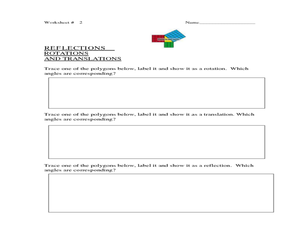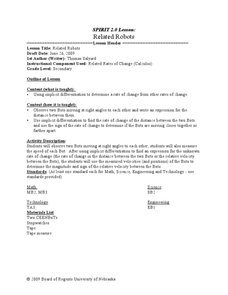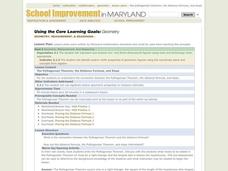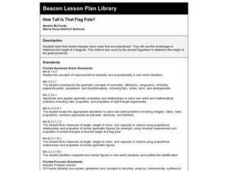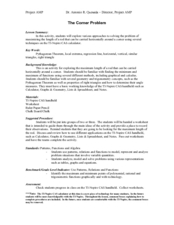Curated OER
Point Comparisons
Young geometers investigate two-dimensional figures using coordinate grids. They identify polygons and draw examples of their reflection, rotation, and translation on a coordinate grid. And they complete a worksheet practicing examples...
Curated OER
How Big Is a Blue?
Students sort and compare/contrast the lengths of various whales. They sort pictures of whales in order of smallest to largest, and given a rope marked with the lengths of the whales, they compare the actual lengths of the whales.
Exploratorium
Rotating String Shapes
Here is a very interesting way of studying triangles and polygons. Pupils work together and use pieces of string to create a variety of shapes. Depending on how many kids are manipulating the string at any one time, the number of...
Curated OER
Similar Triangles
Ninth graders find the height of every day objects using techniques learned through postulates that allow triangles in a problem to be similar. They calculate the length of a missing side and solve proportions.
Curated OER
Obtuse Triangles
Fourth graders explore obtuse triangles. In this geometry instructional activity, 4th graders make obtuse triangles with paper and scissors. They determine how to find the center of their triangle.
Curated OER
Pythagorean Theorem
Students explore how the Pythagorean Theorem works and how to apply it.
Curated OER
Red October
Fourth graders follow directions given in bearings. They invent their own maps using them and use a protractor to help them with their designs. Students
produce their own maps with instructions for navigating the maps. The channels...
Curated OER
Ladybug Adventures
Students solve problems using mathematical skills. In this math lesson, the students use math concepts, to design a virtual path for a ladybug. The students will reinforce their skills in algebra and geometry concepts.
Curated OER
Exploring Trigonometric Ratios
Young scholars identify the ratios of trig functions. In this trigonometry lesson, students construct triangles and use it to derive the values of sine, cosine and tangent. They use Cabri software to create the visual of the identities.
Curated OER
Exploring Indiana's Natural Resources
Fourth graders complete a variety of activities as they study the European exploration of the Midwest, focusing on Indiana. They map the path explorers took, comparing the British with the French. They research why the explorers stopped...
Curated OER
An Introduction to Quadrilaterals
Students explore different types of quadrilaterals. Students define the terminology used with quadrilaterals. They create particular quadrilaterals based on specific characteristics of the quadrilaterals using an online tool.
Curated OER
Related Robots
Students solve problems using implicit differentiation. In this calculus instructional activity, students take the derivative to calculate the rate of change. They observe two robots and draw conclusion from the data collected on the two...
Curated OER
The Laws of Sines and Cosines Made Simple!
Students explore the concept of law of sines and cosines. In this law of sines and cosines activity, students construct a triangle tool from card stock and markers. Students use their triangle tool to aid in solving problems involving...
Curated OER
Studying Special Segments in Triangles
Young scholars investigate special segments in triangles. In this geometry lesson, students graph, compare, estimate and predict findings based on their data. They differentiate between similarity and congruence of triangles.
Curated OER
Ship Shape
Second graders explore shapes. After reading books about shapes, 2nd graders describe the properties of various shapes. They identify shapes if they have been rotated, flipped, or slid. Students create shapes using drawings and geoboards.
Curated OER
The Pythagorean Theorem, the Distance Formula, and Slope
Students explore the concept of the Pythagorean Theorem. In this Pythagorean Theorem lesson, students derive the distance formula and slope of a line from the Pythagorean Theorem.
Curated OER
How Tall Is That Flag Pole?
Pupils examine various triangles and discuss how similar triangles have sides that are proportional. They utilize an ancient Egyptian method to determine the height of a flagpole.
Curated OER
Perimeter and Area
Fifth graders identify the area and perimeter of a rectangle. In this perimeter lesson, 5th graders use geoboards and rubber bands to construct various rectangles. Students use the formula to calculate area and perimeter of the...
Curated OER
Geometry and Quilting
Fourth graders combine geometry and language arts skills while examining quilt-making. After identifying the geometric shapes contained in quilts, they write stories to encompass the quilt border. Students conclude by creating and...
Curated OER
Quiz: Astronomy
In this science worksheet, 3rd graders will focus on various aspects of astronomy. Students will respond to ten questions all pertaining to stars, constellations, planets, and our solar system.
Curated OER
The Corner Problem
Students explore the concept of the corner problem. In this corner problem lesson, students use the TI-NSpire to determine the maximum length a rod can be and still pass horizontally around a corner. Students use similar triangles to...
Curated OER
Drawing Lessons
Middle schoolers recognize and respond to the content of visual art using art vocabulary. They recognize the differences between art materials, techniques, and processes.
Curated OER
The Truth About Triangles And Proofs
Students engage in a lesson that is about the classification of triangles and the mathematical proofs involved in working with them. They work on a variety of problems that are created by the teacher with the focus upon the importance of...
Curated OER
Triangles
Fourth graders participate in three experiments to gain understanding of triangles. In this triangles lesson, 4th graders use pipe cleaners to create bubble pipes, basketball hoops and bingo cards to display the characteristics of...
